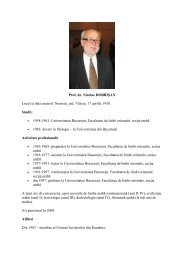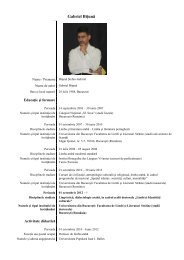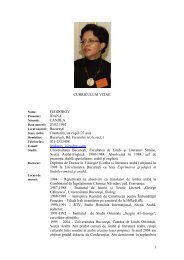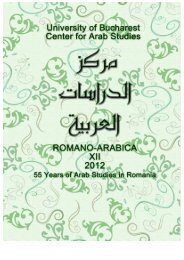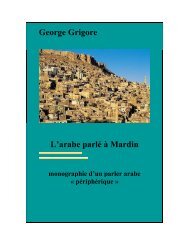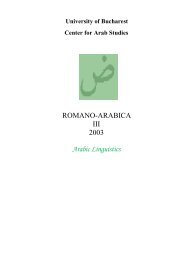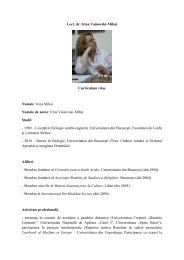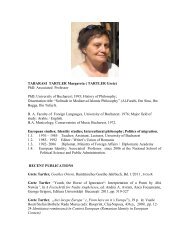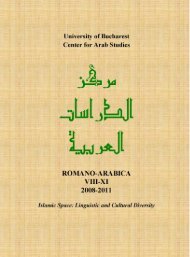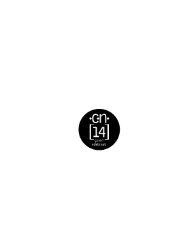University of Bucharest
University of Bucharest
University of Bucharest
You also want an ePaper? Increase the reach of your titles
YUMPU automatically turns print PDFs into web optimized ePapers that Google loves.
either mayy or māy in H~ūzistān. 22 And the second word is tāya ‗shelter‘, which<br />
seems to be very rare in the dialects <strong>of</strong> the region. The verb tawa originally means<br />
‗to stay at a place‘, and tāwa and tāya stand for ‗shelter <strong>of</strong> camels‘. 23 In our poem<br />
it means ‗shelter‘ in a broader sense.<br />
3.3. Another example <strong>of</strong> a Classical Arabic form is to be seen in a verse by<br />
Mullā H}abīb S}ayyāh}ī Sālimī. 24 He is a descendant <strong>of</strong> the third Shi‗ite Imam,<br />
H}usayn and was born in 1969 in a village not far from Bustān. He has been<br />
writing poems from an early age, and a huge number <strong>of</strong> his poems are in praise <strong>of</strong><br />
the third Imam. Here is only one <strong>of</strong> his mis}rā‗s.<br />
1. Tabqā (i)b-had}am wa b-dilla wa-ms}āyib // …<br />
‗You [will] stay in oppression, in submissiveness and disasters‘.<br />
The word tabqā is clearly classical, with the retention <strong>of</strong> the qāf, and in the<br />
Arabic text even an ‘alif maqs}ūra has been put on the final yā‘ to mark length<br />
( ىٰقبت ).<br />
But in another poem composed by Íaydar Maš‗alī from the famous Bayt<br />
Maš‗al clan 25 , the real dialectal version <strong>of</strong> the indefinite form <strong>of</strong> the verb baqiya<br />
can be found.<br />
1. (‘Ağrak ‗alā l-Bārī l-wāh}id il-maškūr) // Yabga hnāk tilgā(h) ib-<br />
ma‗ālī(h).<br />
(‗Your reward is [incumbent] upon the Creator, the One, to whom one<br />
shall be grateful) // If he stays there, you will find him in his excellent<br />
deeds‘.<br />
In this line the Arabic text writes g as a reflex <strong>of</strong> the qāf, and the final -a is<br />
written with a hā‘ (هگتي) which corresponds to its dialectal pronunciation.<br />
3.4. The following line is from Sa‗d ibn Ğabbār Suwārī. 26 He was born in<br />
the first quarter <strong>of</strong> the 20th century in a small village in the border region <strong>of</strong><br />
Bustān. Although he remained illiterate for his whole life, he has composed<br />
22 Ingham 1982, 173 and 174.<br />
23 Al-Munğid 1997, 76.<br />
24 Pūr-Kāz}im 1378/1999, 442-443.<br />
25 Pūr-Kāz}im 1378/1999, 468.<br />
26 Pūr-Kāz}im 1378/1999, 474-475.<br />
46



